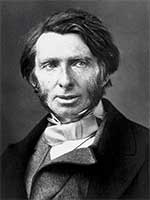
John Ruskin
Engels recensent
Leefde van: 1819 - 1900
Categorie: Media Land: ![]() Verenigd Koninkrijk
Verenigd Koninkrijk
Geboren: 8 februari 1819 Gestorven: 20 januari 1900
Citaten 11 t/m 20 van 36.
-
Er zijn morele en immorele religies, die zowel in voorschrift als in emotie verschillen; doch er is slechts één moraal.
Origineel:There are moral and immoral religions, which differ as much in precept as in emotion; but there is only one morality.
Bron: Lectures on Art (1870) Lecture II, §37― John Ruskin -
Gevangenisstraf is het laatste en minst effectieve instrument die de wetgever heeft voor het voorkomen van criminaliteit.
Origineel:Punishment is the last and least effective instrument in the hands of the legislator for the prevention of crime.
Bron: Notes on the General Principles of Employment for the Destitute and Criminal Classes (1868)― John Ruskin -
Iemand die niet een groot beeldhouwer of schilder is, kan niet een groot architect zijn. Hij is dan slechts een bouwer.
Origineel:No person who is not a great sculptor or painter can be an architect. If he is not a painter or sculptor, he can only be a builder.
Bron: The Seven Lamps of Architecture (1849) Apenda to Lectures I and II― John Ruskin -
Men kan arbeid in 't kort verdelen in positieve en negatieve arbeid: positieve, die leven brengt; negatieve, die de dood brengt.
Origineel:Labour may be shortly divided into positive and negative labour: positive, that which produces life; negative, that which produces death.
Bron: Unto this Last (1860) IV, Ad Valorem― John Ruskin -
Wat is poëzie? De suggestie vanuit de fantasie tot een sublieme voedingsbodem voor sublieme emoties.
Origineel:What is poetry? The suggestion, by the imagination, of noble grounds for the noble emotions.
Bron: Modern painters, Vol V (1860) Part VIII, ch. I, §13― John Ruskin -
Werk zonder vreugd is waardeloos. Werk zonder leed is waardeloos. Leed zonder werk is waardeloos. Vreugde zonder werk is waardeloos.
Origineel:Labour without joy is base. Labour without sorrow is base. Sorrow without labour is base. Joy without labour is base.
Bron: Time and tide (1867) Letter V, §21― John Ruskin -
Wie de waarheid in het hart heeft, hoeft nooit te vrezen dat zijn tong te weinig overtuigingskracht zal hebben.
Origineel:He who has truth at his heart need never fear the want of persuasion on his tongue.
Bron: The Stones of Venice (1853) I. The Foundations, §xcix― John Ruskin -
Beter het kaalste gebouw dat een verhaal vertelt of een daad vermeldt, dan het rijkst versierde zonder betekenis.
Origineel:Better the rudest work that tells a story or records a fact, than the richest without meaning.
Bron: The seven lamps of architecture (1849) ch. VI, §7― John Ruskin -
De eerste plicht van een staat is ervoor te zorgen dat elk kind dat daarin wordt geboren, goed wordt gehuisvest, gekleed, gevoed en opgeleid, totdat het de jaren des onderscheids heeft bereikt.
Origineel:The first duty of a state is to see that every child born therein shall be well housed, clothed, fed, and educated, till it attains years of discretion.
Bron: Time and tide (1867) Letter XIII, §70― John Ruskin -
Er bestaat niet zoiets als slecht weer, alleen maar verschillende soorten goed weer.
Origineel:There was no such thing as bad weather, but only different kinds of pleasant weather.
Bron: The Art of England (1883) The Hill-side― John Ruskin